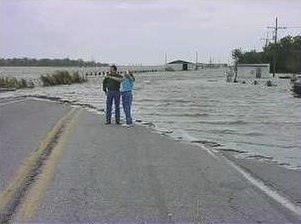
Back سیل ساحلی Persian Submersion marine French Banjir rob ID Coastal flooding SIMPLE Kıyı taşkını Turkish

Coastal flooding occurs when dry and low-lying land is submerged (flooded) by seawater.[1] The range of a coastal flooding is a result of the elevation of floodwater that penetrates the inland which is controlled by the topography of the coastal land exposed to flooding.[1][2] The seawater can flood the land via several different paths: direct flooding, overtopping of a barrier,[3] or breaching of a barrier. Coastal flooding is largely a natural event. Due to the effects of climate change (e.g. sea level rise and an increase in extreme weather events) and an increase in the population living in coastal areas, the damage caused by coastal flood events has intensified and more people are being affected.[4]
Coastal areas are sometimes flooded by unusually high tides, such as spring tides, especially when compounded by high winds and storm surges. This was the cause of the North Sea flood of 1953 which flooded large swathes of the Netherlands and the East coast of England.
When humans modify the coastal environment this can make coastal flooding worse.[1][5][6][7] Extraction of water from groundwater reservoirs in the coastal zone can instigate subsidence of the land, thus increasing the risk of flooding.[5] Engineered protection structures along the coast, such as sea walls, alter the natural processes of the beach. This can lead to erosion on adjacent stretches of the coast which also increases the risk of flooding.[1][7][8]
- ^ a b c d Ramsay & Bell 2008
- ^ Doornkamp 1998.
- ^ Almar, Rafael; Ranasinghe, Roshanka; Bergsma, Erwin W. J.; Diaz, Harold; et al. (18 June 2021). "A global analysis of extreme coastal water levels with implications for potential coastal overtopping". Nature Communications. 12 (1): 3775. Bibcode:2021NatCo..12.3775A. doi:10.1038/s41467-021-24008-9. PMC 8213734. PMID 34145274.
- ^ "Report: Flooded Future: Global vulnerability to sea level rise worse than previously understood". www.climatecentral.org. Archived from the original on 2020-03-30. Retrieved 2020-11-09.
- ^ a b Nicholls 2002
- ^ Griffis 2007
- ^ a b Dawson et al. 2009
- ^ Pope 1997
© MMXXIII Rich X Search. We shall prevail. All rights reserved. Rich X Search